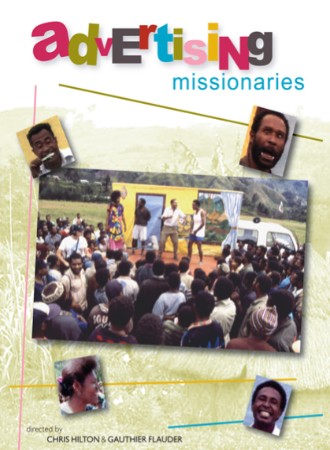
Advertising Missionaries 1996
Distributed by First Run/Icarus Films, 32 Court St., 21st Floor, Brooklyn, NY 11201; 800-876-1710
Produced by Aspire Films/Ellipse Programme
Directed by Chris Hilton and Gauthier Flauder
VHS, color, 52 min.
High School - Adult
Management, Communication
Date Entered: 11/09/2018
Reviewed by Charles Burkart, Head, Audiovisual Library, West Virginia University, Morgantown, WVThe culture clash between traditional Papua New Guinea tribal culture and western consumerism is the dominant theme of this excellent and interesting documentary. The lives of the traditional indigenous people, Aluago, Tintiba and their children, in the remote valley of Yaluba are contrasted with the lives of the traveling native entrepreneurs (Elijah, Peter, Robert and Tina) in this amusing, but ultimately troubling road show.
The People of Papua New Guinea, isolated in their rural highlands, have lived for thousands of years by subsistence agriculture. Sweet potatoes form their stable, monotonous diet and are eaten at almost every meal. Shells and pigs are used as currency, and men construct elaborate, culturally important wigs out of their own hair. In this traditional society men and women live apart, and only meet together for relations during the day when they cultivate their separate fields. Sometimes, minor personal feuds can quickly escalate into bloody tribal violence.
An itinerant band of traveling salesmen/theater players have come to these remote highland jungles to sell the gospel of western consumerism. The theater group must use vaudeville to advertise consumer products because most of the population of New Guinea, who lack electricity or plumbing, cannot be reached by other advertizing methods. Resembling the traveling medicine shows of the old west, the "advertizing missionaries" are deterred by neither rural highwaymen, called "rascals" in New Guinea, nor by the muddy, impassable, roads. The "missionaries" simple heartfelt skits help inflame the people's desire for western consumer products.
For the first time, tribal people are told they need to vary their sweet potato diet with Trukai Rice, quench their thirst with Coca Cola, and wash their clothes with Blue Omo. Baseball caps have replaced the ceremonial hair wigs formerly made by men and shotguns have replaced bows and arrows as the preferred instruments of violence with bloody results. Alcoholism, the result of beer and liquor imports, has led to an increase in family violence. Missionaries have told the people that men and women need to live together and not sleep apart in separate huts.
A cash economy is supplanting the traditional barter economy because indigenous people need money to buy western consumer products. Traditional Papua New Guinea society is being transformed in unexpected ways. Poor people are moving to the city to seek the "luxury life." The documentary seems to ask the question are these changes for the better?
Production values are excellent in Advertising Missionaries. The cinematography has a polished, professional look. The film's editing (pace of the film's images) is excellent and grabs the interest of the viewer. The video has superb, unobtrusive sound and music. English subtitles are used with the indigenous language, but the narration and some of the dialog are in English.
This program is suitable for college anthropology and sociology classes, and high school classes dealing with change in society. Advertising and business marketing programs may also find this an interesting and useful documentary. Recommended.